A bipartisan group of 109 lawmakers submitted a letter to President Donald Trump on Monday, urging the president to help stabilize the cotton industry.
The letter was a joint effort with House Agriculture Committee Chairman Mike Conaway, House Agriculture Committee Ranking Member Collin Peterson (D-Minn.), General Farm Commodities and Risk Managmement Subcommittee Chairman Rick Crawford (R-Ark.), Subcommittee Ranking Member Rick Nolan (D-Minn.), House Appropriations Agriculture Subcommittee Chairman Robert Aderholt (R-Ala.), Subcommittee Ranking Member Sanford Bishop (D-GA) and committee members Rep. Jodey Arrington (R-Texas) and Rep. Tom O’Halleran (D-Ariz).
“If our farmers don’t have the resources they need, then they can’t do anything that’s beneficial,” said Rep. Jodey Arrington (R-Texas) on a conference call with West Texas farmers and ranchers.
The lawmakers, led by House Agriculture Committee Chairman Mike Conaway, are working toward a solution that would make the Cotton Ginning Cost Share program permanent and provide more certainty for farmers.
“We can’t continue ignoring the economic turmoil of U.S. cotton farmers. While countries like China and India are pouring billions of dollars into subsidies for fiber production each year, America’s cotton producers have been struggling to scrape by without a safety net to help them soldier through these tough times—the steepest slide in net farm income since the Great Depression,” Conaway, who led efforts to unite the 109 urban and rural Republicans and Democrats, said in a statement. “Cotton producers can’t wait until the next farm bill. They need help now. I urge the president to stand shoulder-to-shoulder with U.S. cotton farmers to provide them with the assistance they so desperately need.”
The letter cited subsidies to farmers in China and other countries, along with tariffs, as a factor in plummeting cotton prices.
The lawmakers also reported that more than farmers have been effected. Gins, warehouses, marketing cooperatives, merchants, cottonseed processors, merchandisers and textile manufacturers across the 17-state Cotton Belt have been negatively impacted.
“For example, over the past decade, the numbers of businesses involved in the ginning and warehousing of cotton have declined by 33 and 21 percent, respectively,” the letter stated. “It is imperative that we protect the remaining 20,000 businesses in this industry that employ 126,000 people and generate over $21 billion in revenue or America risks losing this important sector of our economy in the same way we lost much or our textile industry, once the largest part of the U.S. manufacturing sector.”
In order for U.S. growers to compete, assistance is needed, according to farm organizations.
The American Farm Bureau Federation and Texas Farm Bureau have advocated for a cotton lint program and/or designating cottonseed as an “other oilseed” to make cotton eligible for Title I commodity support programs.
The Cotton Ginning Cost Share program, which was originally intended as a one-time, cost-share payment to farmers based on their 2015 acreage, helped farmers who were facing low cotton prices without adequate assistance through the 2014 Farm Bill.

